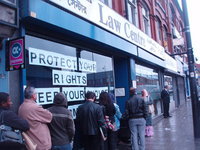Legal aid in crisis in Manchester?
Article published: Wednesday, September 29th 2010
 Today campaigners are set to march on the Labour party conference to call for support for the South Manchester Law Centre which faces closure. MULE’s Michael Pooler asks why this valued and well used service is being forced to shut its doors and argues that far from an isolated incident, its closure is part of a systemic effort which threatens access to justice not only in Manchester but across the country.
Today campaigners are set to march on the Labour party conference to call for support for the South Manchester Law Centre which faces closure. MULE’s Michael Pooler asks why this valued and well used service is being forced to shut its doors and argues that far from an isolated incident, its closure is part of a systemic effort which threatens access to justice not only in Manchester but across the country.
The Law Centre based in Longsight – one of the first to be opened outside London – has provided expert legal advice and representation for over 34 years in the areas of immigration, employment, housing and welfare rights law. It boasts specialist services such as a dedicated caseworker who works with female victims of domestic abuse who subject to immigration controls, and has won plaudits for its work with the Somali community.
Firmly established in the community, the centre gained commendation for the quality of its work in an independent review of advice services in Manchester published in 2008 which declared that “it has a national reputation for expertise in [asylum, immigration and nationality issues], not only providing expert casework but [also] social policy evidence to campaign for changes in the legislation and practice…”
Money issues
The reason for its closure therefore doesn’t stem from under use or poor service, instead it lies behind changes to the way legal aid is funded.
In previous years the centre was funded jointly by the Legal Services Commission (LSC) and the council. Suppliers of non-criminal legal aid work were awarded contracts by the LSC, within specific categories of law. For solicitors and legal advisers the Commission would set the number of cases the supplier was authorised to start in a year, while not-for-profit organisations were funded based on a number of allocated hours per year for each caseworker post. Other work such as representation in family and other civil matters would be decided on a case-by-case basis by the LSC.
However this year saw the introduction of a competitive tendering process by the Legal Services Commission (LSC), the quango responsible for awarding legal aid funding. This meant that providers of services – whether they be charities, not-for-profit organisations or private firms – for the first time had to compete against one another for block contracts for a set number of case starts.
South Manchester Law Centre, despite its reputation and broad range of services, was awarded contracts far below its capacity: only one third of the asylum cases and a sixth of the immigration cases it has capacity for.
Manchester City Council has now also withdrawn its funding, meaning that the centre will lose £40,000 a month – or four fifths of the money it requires to run – and so will no longer be able to take on new clients.
Marketisation
The logic behind the competitive tendering process was that free markets would set prices which reflect the true operating costs of firms providing legal aid services and consequently that inefficiencies would be eliminated. The reforms follow recommendations of the 2007 Carter Report aiming to bring down costs in legal aid.
Yet critics believe that it could actually harm the quality of services because providers, who are encouraged to outbid each other in order to gain contracts, may offer lower prices than what cases incur simply for survival. In 2009 Omar Khan of the Young Legal Aid Lawyers Association warned that firms may “resort to practices that compromise quality in order to save money”.
The Constitutional Affairs Select Committee published a detailed report in May 2007 highly critical of government proposals for changes in legal aid. The committee of MPs said that the proposals constituted a “breathtaking risk” and in particular the introduction of fixed fees could have “unintended adverse consequences for the quality and availability of legal aid”.
The recent changes are merely the latest stage of reforms which have had a detrimental impact on the delivery of legal aid services. 2007 saw the introduction of fixed and graduated fees for legal aid; this meant that instead of being paid hourly – the normal practice in the profession – lawyers would receive a flat fee, regardless of the complexity of the case or the length of time it takes to resolve. In reality firms who put in extra work into cases – such as interpretation, translation of documents, obtaining medical examinations – are effectively penalised, as they end up running unprofitable (albeit potentially successful) cases.
The result is that in certain cases caseworkers may be forced to choose between the quality and depth of work and the viability of the business – a fear that was originally aired by the Constitutional Select Committee back in 2007. To compound this fees are only paid on the completion of the case. It was this aspect which led to the collapse of the highly esteemed Refugee and Migrant Justice (RMJ) in June.
More Closures?
In addition two other providers of legal aid services in Manchester are to see drastic reductions in their ability to provide services. Wythenshawe Law Centre finds itself in a similar situation to that of the Longsight centre. Although the centre has not yet issued redundancy notices to its employees, senior solicitor Gillian Hodges told the Legal Action Group blog that it is ‘at serious risk of closing’.
Meanwhile Greater Manchester Immigration Aid Unit, a charity which gives free advice and representation in matters of immigration, asylum and nationality will have its funding cut by 70% from November. While the Unit is not threatened with closure, the funding gap signifies that it will have to massively decrease its workload and consequently the number of new clients it can take on.
A spokesperson for the Manchester Anti-Deportation (MAD) Alliance said: “It is of paramount importance that dedicated, caring and knowledgeable individuals and organisations including GMIAU, South Manchester Law Centreand Wythenshawe Law Centre are protected against cuts. These cuts have arisen from a perverse, confused, immoral and incoherent tendering process orchestrated by Legal Services Commission, in cahoots with local authorities and the Ministry of (not) Justice.”
The Council argue that six new centres, due to be built this year, will better serve the population as well as making access to services easier. Yet critics say that these will fail to provide the same level of expertise in complex areas of law. One unnamed source told Mule “ the employment of caseworkers with less experience and knowledge means that clients are likely to see less favourable resolutions to their cases.”
Campaign
Friends of South Manchester Law Centre have launched a public campaign to highlight the plight of the centre and rally against its closure, emphasizing that thousands of vulnerable people in the area will lose an invaluable and free service should the decision not be reversed.
GMIAU meanwhile has launched a legal challenge of the LSC’s decision and hopes to be able to continue to work at full capacity. On a national level the Law Society is leading a Judicial Review to oppose the process by which Family Law funding was allocated.
There will be a protest demonstration today (29/09/10) outside the Legal Services Commission Office at 90 Great Bridgewater Street, Manchester at 1.30pm to defend legal aid services.
This will be followed by a public meeting at the Friends’ Meeting House (behind Central Library): “Access to Justice: Defending Immigration Legal Aid”. Invited speakers include local Manchester MPs, immigration lawyers and advice workers and people subject to immigration controls who will be directly affected by the cuts.
To get involved with the campaigns to defend legal aid and the law centres contact:
South Manchester Law Centre – admin (at) smlc.org.uk
Greater Manchester Immigration Aid Unit – info (at) gmiau.org
More: Cuts, Features, Migration and asylum, Welfare
Comments
-
I used to volunteer for South Manchester Law Centre years ago and would have liked to go along to Great Bridgewater Street and to the meeting to support them.
But this isn’t enough notice for protests and meetings on the same day.
Please can you post stories like this – with calls to action – sooner in future? Thanks.
Comment by Lulu on September 29, 2010 at 11:13 am -
Sorry about that, our fault. Stretched volunteer resources contributed to this article being published later than we hoped. In the future we will make sure to give notice for events like this one.
Comment by Michael - Editorial Collective on September 29, 2010 at 1:10 pm -
[…] this article: Legal aid in crisis in Manchester? — MULE Related Posts:Legal aid: How much help can you get? There is no legal aid for representation at an […]
Pingback by Legal aid in crisis in Manchester? — MULE | judicial system report on September 30, 2010 at 3:07 pm -
[…] Greater Manchester Immigration Aid Unit (GMIAU) will be holding a social event this Friday at Chorlton Irish Club. Acts will include Afro-European dance music star Freddy Wanga, Monkey Poet Matt Panesh and a performance from Women Asylum Seekers Together (WAST). The aim of the night is to raise funds for vulnerable asylum seekers and those who rely on the services of the Unit. Funding is now of acute importance for the organisation following the news that it is to see 70% slashed from its legal aid funding as previously reported by MULE. […]
Pingback by Greater Manchester Immigration Aid Unit Social Evening – this Friday 8 October — MULE on October 6, 2010 at 6:45 pm -
All this sounds like a sector pining for the old days when they could be ‘charitable’ while receiving guaranteed amounts of public money for their wages.
Who cares what ‘the normal practice in the profession’ is? If these lawyers want paying from public funds they have to take the terms and conditions the public’s elected representatives choose to impose. The piper always calls the tune.
Many people of modest means who haved lived in the UK and paid taxes for years are unable to get legal aid when they’d like to. One solution to the difficulty in getting legal aid for matters of asylum and immigration would be to remove the rights of these people to receive it. Such a move would be an opportunity for genuinely charitable lawyers to offer legal aid for free in their own time.
Comment by simon on October 29, 2010 at 5:01 pm -
The LSC, the body which introduced fixed and variable fees and the competitive tendering process for allocation of funds, is a quango – not a body of elected representatives. The home office is notorious for not impressing upon vulnerable people the necessity of having a lawyer when making an asylum claim. Even most English speakers would fail at the first hurdle of filling in the forms. Simon seems to have grossly misunderstood the nature of ‘charitable’. In the sense of an organisation it is one which is run for public benefit and not for commercial gain. Professionals working within them still need to be paid. Pro bono work on the other hand is offered usually by lawyers who have a secure enough income to give free time to causes. Are you suggesting that all ‘charitable work’ – which includes much social work, care work, palliative treament of people with terminal illnesses and counselling services to name a few – should be delivered without remuneration? This sounds akin to the Big Society – a situation where we remove professionals from these areas and thus drastically reduce the quality of service and standards.
Comment by James on October 29, 2010 at 5:36 pm -
I’ve not misunderstood the meaning of ‘charitable’ at all. Like most people I know what it means in everyday language.
In the context of this article the word is being used in its government/quango/wholly public money funded charity form. This often entails people making quite good livings on public money while claiming to ‘work for charity’.
Comment by simon on November 1, 2010 at 7:41 pm -
[…] Longsight-based Law Centre will close in two weeks’ time unless the decision to end its funding is reversed. The Legal Services Commission (LSC), the body which allocates legal aid funding, […]
Pingback by Fight to Save South Manchester Law Centre gains momentum — MULE on November 2, 2010 at 10:39 am -
[…] huge cuts in their budgets due to a change in the regime for allocating legal aid funding, as reported by MULE over the past two months. However a victory last week at the High Court in Manchester gave grounds […]
Pingback by Law centre campaigners hold protest outside Legal Services Commission — MULE on November 16, 2010 at 1:11 pm -
[…] organisations and progressive political groupings from across the region. On the bill already are Save South Manchester Law Centre campaigner John Nicholson, Secretary of the North West Pensioners’ Association Derek Barton […]
Pingback by Unions and communities to mobilise against cuts — MULE on January 6, 2011 at 11:48 am -
[…] North Manchester and Wythenshawe Law Centres have both been forced to close in recent years, while South Manchester Law Centre in Longsight lost nearly all of its funding last year and now only provides immigration and asylum work. Such cuts would reduce the role of […]
Pingback by Advice services in Manchester in jeopardy — MULE on February 17, 2011 at 2:15 pm -
[…] Manchester City Council withdrew funding for generalist advice, leaving the centre in a perilous position and unable to provide most […]
Pingback by Government agency spent £34,000 in bid to block free legal advice — MULE on February 18, 2011 at 5:59 pm
The comments are closed.





